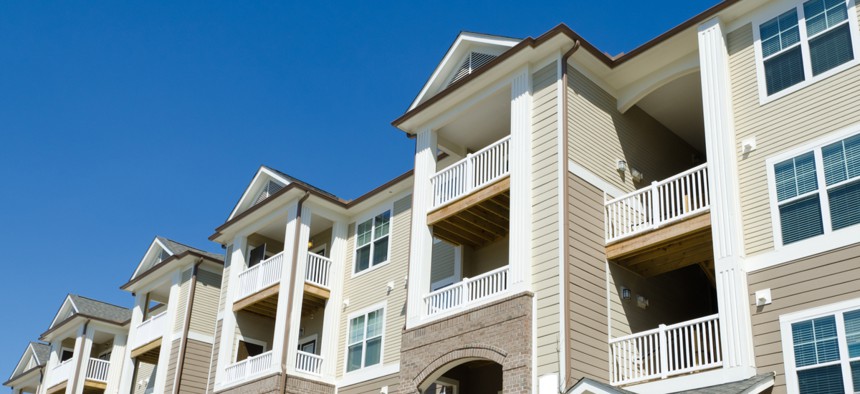When It Comes to Our Current Housing Crisis, Cities Can’t Wait for the Federal Government to Help

Cities must step up to provide affordable housing options to their residents. SHUTTERSTOCK
COMMENTARY | State and local leaders have options to alleviate housing insecurity amid the pandemic.
With Covid-19 infections persisting at high levels and safety nets from federal and state policies expiring, local leaders are left to grapple with unprecedented housing challenges. While the recent eviction moratorium issued by the Trump Administration will prevent most renters from being forced from their homes, this measure is only a temporary reprieve. Thousands of our residents, particularly working-class renters, could still end up without roofs over their heads because of a crisis out of their control. However, headlines that predict a wave of people forced from their homes don’t need to become a reality. There are a variety of tools for state and local leaders to leverage to limit tenants’ pain during this crisis.
We learned long ago that we cannot wait for Washington, although we continue to urge Congress to act. Instead, we are taking immediate steps to ensure that, after the pandemic, we don’t simply return to the pre-Covid status quo, but build a more equitable and inclusive housing future for all residents.
As we know too well, Covid-19 has laid bare many of the preexisting inequities that lurked just below the surface of our national dialogue, exposing flaws and systemic gaps in everything from our social safety net to our national supply chains. It’s no different in the world of housing.
Before the pandemic, Black households were twice as likely to rent as white households, and housing costs took up more of their paychecks. According to the Urban Institute, among Black Americans, 55% paid more than 30% of their income toward housing. This compares to 40% of white Americans who pay the same amount. Add in the economic consequences of Covid, which have affected minority communities disproportionately, and you get a volatile mix of underlying factors which, if not addressed, threaten to undermine the American housing market from within.
The numbers are clear: minority communities that are experiencing historic unemployment numbers need housing assistance the most, and policymakers can and should make that a reality. State and local governments are the laboratories of democracy. With or without federal aid, we have the opportunity to respond effectively across the country and aid our communities that desperately need the help.
As co-chairs of the NewDEAL Forum’s Renewing America Task Force, which aims to identify policy solutions to rebuild the nation’s economy in the wake of the pandemic, we have seen firsthand the innovative initiatives being pioneered by state and local leaders from across the country. Based on their efforts, we have recently released guidance for improving access to affordable housing. From opening vacant hotels to cities' homeless populations during stay-at-home orders to finding realistic alternatives to the traditionally burdensome security deposit requirement, these leaders are making meaningful differences in their communities.
We’ve also been taking aggressive action in our cities by implementing two critical, common-sense policy practices. The first is the prioritization of direct aid in the form of rental assistance to both tenants and landlords. The second is the support of continued investment in affordable housing stock through whatever funding is available and administrative consolidation.
Under Mayor Harris, Shelby County—Tennessee’s largest county—created a $2 million eviction settlement fund. This fund works with tenants and landlords to arrive at an equitable settlement for both parties, with the fund making up any differences in settlement cost and ability to pay. Legal aid is provided pro-bono to renters, and resources are made available both to renters and landlords to disincentivize future evictions.
In Phoenix, America’s fastest growing housing market (which is experiencing skyrocketing prices), Mayor Gallego recently announced the Housing Phoenix Plan, which pledges to create or preserve 50,000 housing units by 2030. By using varied approaches, including streamlining the permitting process and incentivizing affordable housing developments, Phoenix will lower monetary barriers to accessing affordable housing while creating growth that is broadly earned and sustainable.
As local leaders, we see our communities from the street level. While federal aid programs like the CARES Act are broadly targeted out of necessity, we have the ability to use neighborhood-level focus to address the many who fell through the cracks of federal assistance programs.
With continued focus and investment from the federal government, and by prioritizing housing solutions that aim to address pre-pandemic inequalities, local policymakers have the opportunity and responsibility not to return to the status quo of a few months ago, but rather to create a new America that works better for everyone.
We urge Congress to immediately provide the direct relief for devastated state, county and city budgets so that our solutions will reach as many people as possible. But we aren't holding our breath. Instead, we are putting in place the solutions we know will help our neighbors.
Mayor Lee Harris is mayor of Shelby County, Tennessee. Mayor Kate Gallego is mayor of Phoenix, Arizona.
NEXT STORY: How I Mastered the Art of Ventilating My Home





